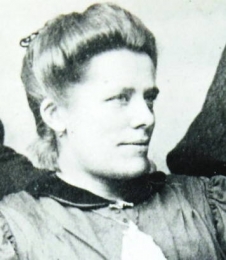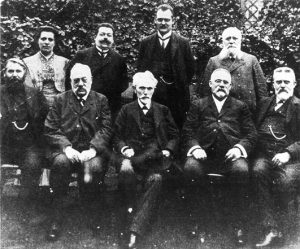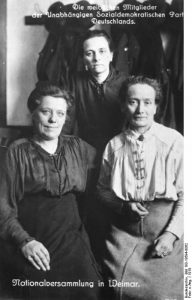Luise Zietz (1865-1922)
“Tell them: wherever the banners of independents are hoisted, there you will find fighters for women’s rights and women’s protection”
Luise Zietz was a leader of the socialist women’s movement in Germany during the first two centuries. She was the first women that officially joined the party executive of the Social Democratic Party of Germany (SPD) in 1908, when German women for the first time in German history were allowed to officially join political parties. She presented the female members of the SPD in the party executive in a time when the German social democratic women’s movement became the largest working class women’s movement worldwide.
Luise Zietz was born on March 25, 1865 in the Holstein village of Bargteheide, near Hamburg, Germany. Raised in a poor weaver family, Luise spun and delivered wool at the age of nine. As the eldest of six siblings, she had to work hard in order to financially assist her family. After attending elementary school, she first earned her living as a domestic servant, and then became a worker first in a tobacco factory and afterwards coffee processing factory. She saved money to finance the training as a kindergarten teacher. In 1890, she married the Hamburg dock worker Carl Zietz. Both joined the trade union and the SPD in 1892. Her husband and she became both very active in the social democratic labor movement of the harbor city Hamburg.
Although Zietz did not receive much school education, she enjoyed reading during her spare time and gradually acquired a rhetoric for expression of her political beliefs as it pertains to women’s rights. For the first time she made her voice heard during a long strike of the dock workers in Hamburg in 1896. She tried to motivate the wives of the workers to support the strike. From 1898 to 1904 Zietz was the leader of the local trade unions organization of the unskilled workers in Hamburg.
The SPD was the first political party in Europe that officially supported universal suffrage for both men and women since the late nineteenth century. Because of political laws that prohibited women to become members of political parties the social democratic women formed in 1892 their own women’s organization, which fought for both: social justice and gender equality. The SPD women’s organization gave women a safe space to discuss their situation and the inequalities and challenges that they faced as a woman in society during this time.
Luise Zietz rose steadily in the party hierarchy of the SPD. Her activism, her powerful voice and her eloquent language led to her election in 1908 as the first woman to be hold a position on the executive committee of the SPD. As a feminist and socialist, she focused on getting more women interested in socialism. She supported universal suffrage for both men and women, as well as the emancipation of children in poverty. Together with Clara Zetkin, Luise Zietz suggested the International Women’s Day to the Second Socialist International In Copenhagen, as a days for the struggle for women’s rights.
From 1912-1916, Luise Zietz served as the secretary of the SPD executive committee. During World War, she encouraged SPD women to provide community social services such as child welfare and care for the sick and women in childbed and join the National Women’s Front, initiated by the bourgeois women’s organizations for the war support. But her opposition against the First World War and the support of the majority of the SPD leadership of the war grew. In April 1917 Zietz joined the newly founded Independent Social Democratic Party (USPD), which had separated from the SPD. The USPD gave the socialist opposition against World War I in Germany a voice.
After the Novemberrevolution 1918, when the Weimar Republic was founded, women in Germany finally got the right to vote. Luise Zietz was elected for the USPD into the National Assembly, the first parliament of the Weimar Republic, in January 19, 1919. Together with her 41 women from different parties she worked for women’s interest in the first democratic elected parliament of Germany parliament. She diligently pushed for a politics that supported working women’s interests and women’s equality
Luise Zietz died on January 27, 1922. Although she is no longer alive, her legacy will be remembered and commemorated. Today, International Women’s day is annually celebrated on March 8th. It focuses on the women’s right movement as well as celebrates the social, political, economic, and cultural achievements of women all around the world. International Women’s Day advocates gender equality and calls for action to accelerate gender parity. The hard work and diligence of Luise Zietz continues as women all over the world fight for equality.
Leeza Mason, Biology Major, Chemistry and History Minors, Class of 2019
Sources
Literature and Websites
- Biesinger, Joseph. “Historical Dictionary A-Z.” In Germany: A Reference Guide from the Renaissance to the Present, 755. New York: InfoBase, 2006.
- Frevert, Ute, “Women Worker, Workers’ Wives and Social Democracy in Imperial Germany,” in Bernstein to Brandt: A Short History of German Social Democracy, ed. Roger Fletcher (London: Edward Arnold, 1987), 34-44.
- Sowervine, Charles, “Socialism, Feminism, and the Socialist Women’s Movement from the French Revolution to World War II,” in Becoming Visible, ed. Bridenthal et al., 357-387.
- Zietz, Luise, “The Revolution in Life and Morals.” In In Women and the Politics, 1880-1950, ed. Susan G. Bell, and Karen M. Offen, eds. 296-98. Standford, CA: Stanford University Press, 1983.



